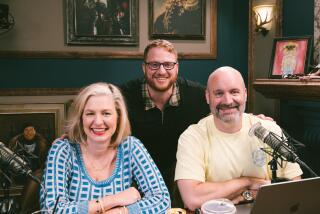From its new $38-million home, can radio tastemaker KCRW adapt to a podcast world?
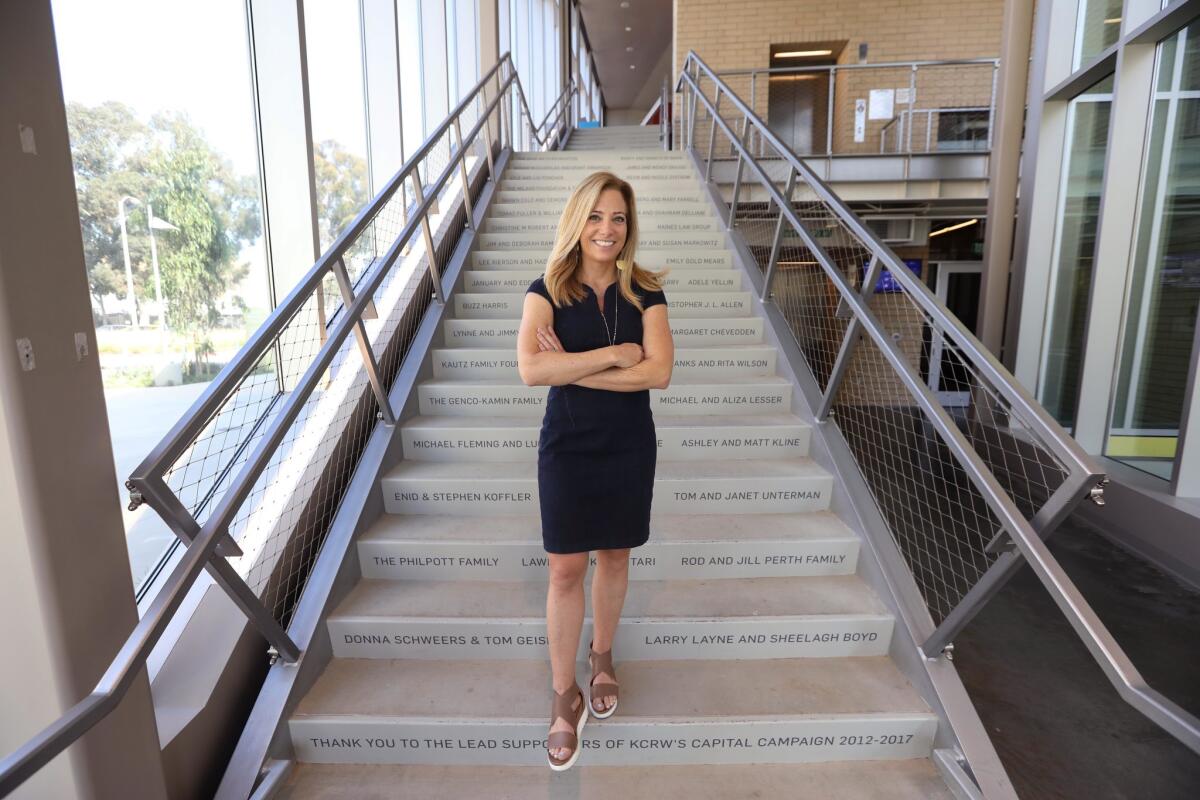
- Share via
Over the last few months, engineers at left-of-the-dial radio station KCRW-FM (89.9) have been testing systems and training programmers in advance of a landmark moment. After decades spent working from cramped headquarters in the basement of Santa Monica College’s cafeteria, the broadcaster is powering down its subterranean studios and moving into a new building, the $38-million KCRW Media Center.
Gesturing toward the third-floor window of a new office at the Media Center, about a mile from its longtime home, KCRW President Jennifer Ferro says with excitement, “Now, here we are, front-facing on a street, glass everywhere, windows bright, open. It’s this radical transformation.” She predicts the center will be not only a media hub but also a cultural one for the community.
The 34,000-square-foot facility has been a long time coming — 11 years, to be exact. And it couldn’t come soon enough for the station competing with thousands of other entities, big and small, hoping to occupy the head-space of millions of listeners in Southern California and elsewhere around the world.
“It’s a time of change,” says Jason Bentley, the station’s music director since late 2008 and host of its flagship show, “Morning Becomes Eclectic.” Last week, between live in-house recordings of the bands Elbow, Beach House, Spoon and more, he narrated the relocation over the airwaves as the show concluded its run in the basement studio, noting movers hauling out gear and boxes. Other shows will follow as new equipment at the Media Center comes online.
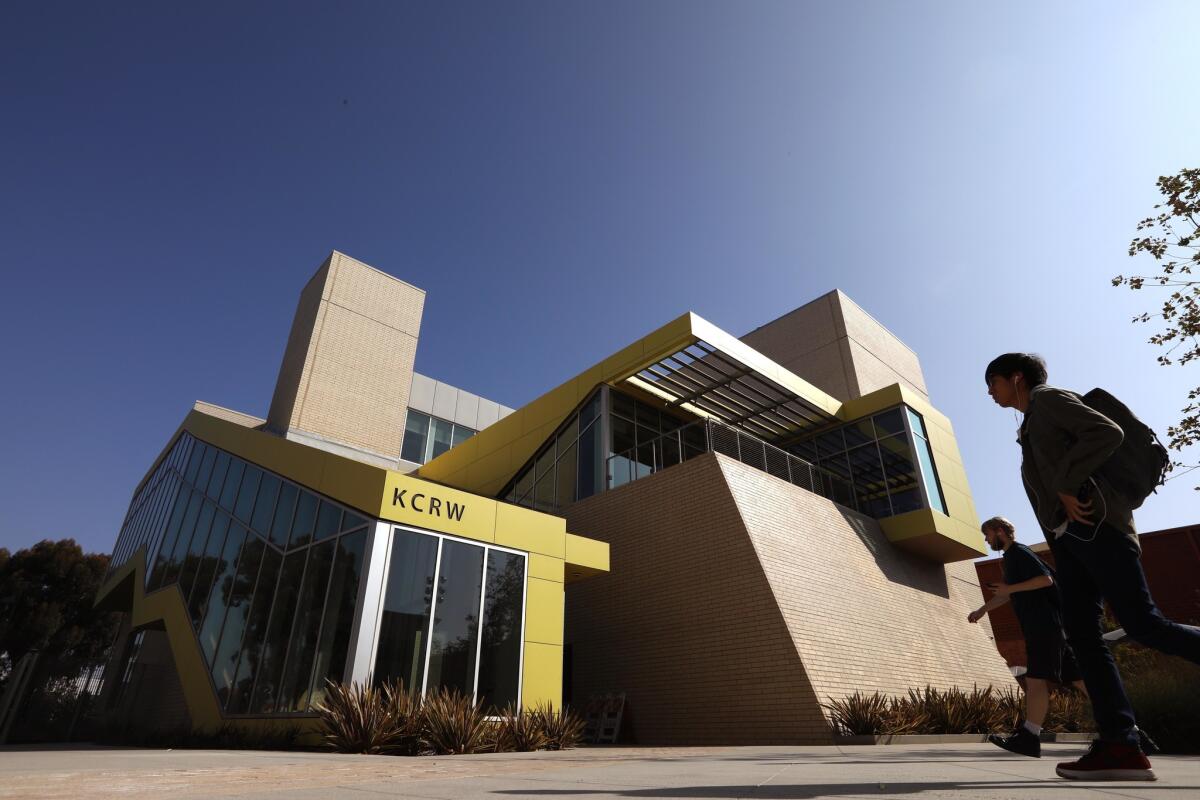
MORE:Jenny Lewis, full of confidence and ballads, on why she isn’t running away anymore »
The changes are more than cosmetic. Behind the scenes, Bentley recently shuffled the schedule and replaced a few DJs, part of what he calls “breaking up the concrete” of the music programming that largely set the template for public radio music.
Within the ragtag rooms of KCRW’s old headquarters, hundreds of artists, including Adele, Coldplay and Radiohead, earned some of their first major exposure during the station’s 80 hours of weekly music programming. But unlike when KCRW first started broadcasting in 1945 — and when the three-hour music block “Morning Becomes Eclectic” debuted in 1977 — terrestrial radio no longer monopolizes the attention of commute-time ears. New automobile dashboards offer infinite options, from satellite radio to bluetooth-enabled portals allowing for instant podcast action. The audio marketplace is a feast of riches.
“Three years ago or four years ago, everybody was like, ‘Radio is dead. Everything audio is dead,’” Ferro says. “Now, everybody’s racing to do audio.”
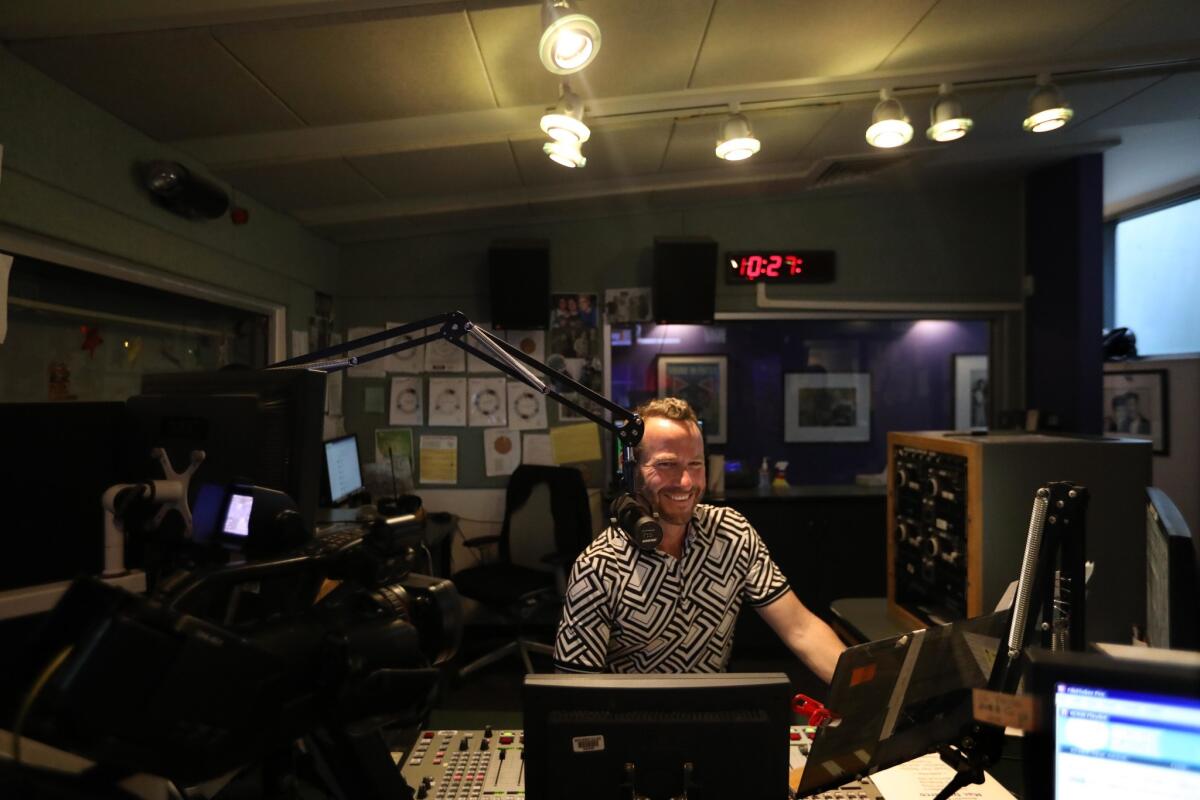
MORE: Active listening? Hi-fi bars in Los Angeles deliver vinyl-only audiophile sound »
If Ferro seems eager to advance the dark-to-daylight symbolism, it’s partly because the evolution sheds light on some of the successes that have come under her guidance. For one, she is on the tail end of a lucrative capital campaign to fill the new facility with the modern studio technology designed to deliver hundreds of hours of weekly programming. She and her team have raised over $50 million — more than half for building construction, which was also partly funded by a 2008 bond measure, $10 million for new equipment and networks, and another $10 million for future programming and distribution.
Ferro’s enthusiasm is also reflective of the stakes, which are laid out as part of the station’s most recent financial statement: “KCRW’s largest challenge is the same for all media companies today — how to stay relevant in the digital age and find sources of revenue in an increasingly competitive landscape.”
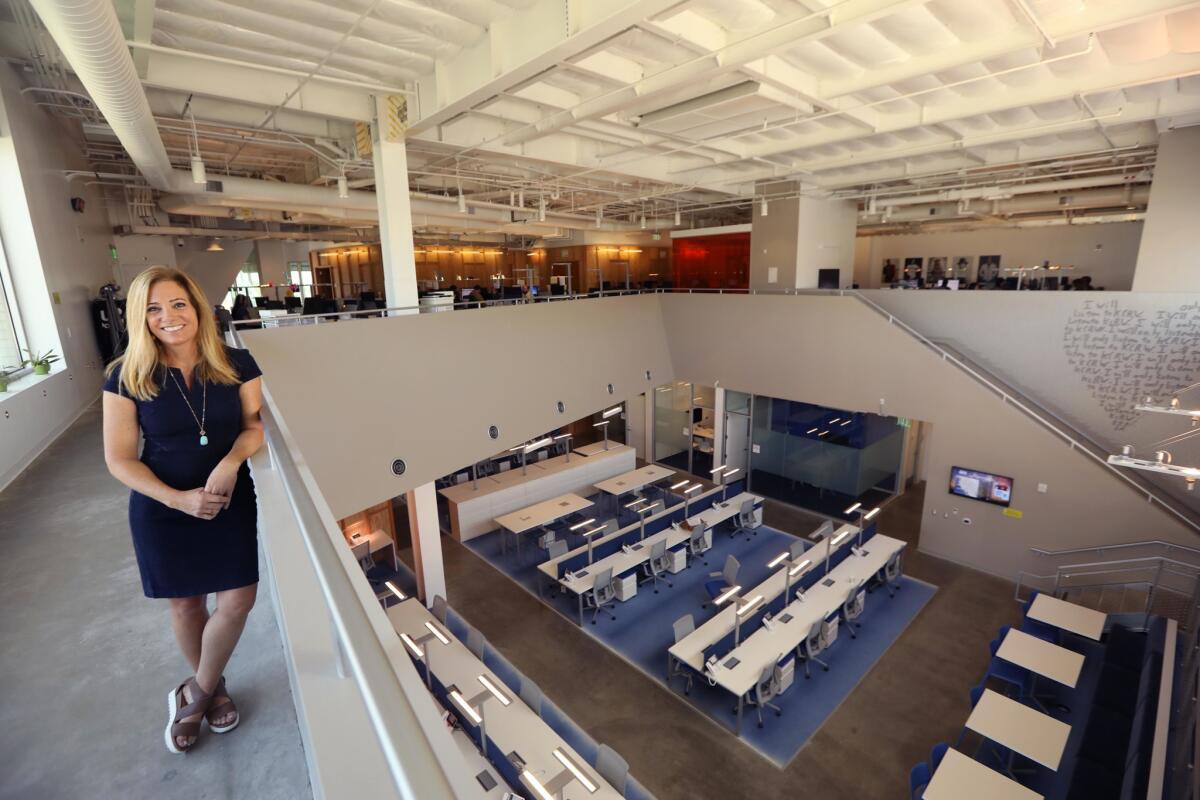
Competing NPR stations
KCRW is one of two National Public Radio affiliates in the Los Angeles market competing for an often-overlapping audience — the other being the all-talk KPCC-FM (89.3) — and its most bankable assets have always included its role as a musical taste-maker and public radio trend-setter. But it was long considered an outlier among other public stations.
When many college-owned nonprofit stations were dividing programming between news and classical music, Ruth Seymour, KCRW’s general manager from 1978 to 2010, was advocating for adventurous contemporary music. On the talk side, KCRW was the first station outside Chicago to air “This American Life,” the influential Ira Glass-hosted storytelling show. Another renegade program, “Joe Frank: Work in Progress,” featured the titular host producing “radio noir” dramas. Comedic actor Harry Shearer, who started his long-running “Le Show” at KCRW, once described Frank’s style “like a fist coming out of the radio.”
From a business perspective, though, the mix of NPR-style programming and free-form music has been tough to square in recent years.
“It doesn’t make sense from the public radio model to have both talk and music on the exact same station,” Ferro says of KCRW’s unique challenge.
Southern California Public Radio, KCRW’s cross-town competitor, operates KPCC and is thriving. Last year, it bought popular Los Angeles culture site LAist. In January, The Times reported that since 2000, SCPR’s broadcast audience had quadrupled. With memberships surpassing a record 73,000, the station reaches an average 800,000 people per week and is the 10th-most popular station in the L.A. market.
KCRW, by comparison, reaches an average of 540,000 people per week and has 45,000 members, according to its 2018 audit. That’s 10,000 fewer members than in its 2007 audit — and a change in the region’s public radio hierarchy. In 2000, KCRW was the top-ranked public radio station in the L.A. market, classical music station KUSC-FM was second and KPCC was a distant third.
Ferro says the membership decline, in part due to a database cleanup, doesn’t reflect an increase in money raised by the station. “If you look at actual dollars in our budget,” she notes, “our revenue from individuals has grown by more than 15%.”
The station, she adds, is seeing a growth in individual giving “at both the lower levels and our highest.”
“More people are making investments in KCRW, which is the ultimate measure of our overall relevance,” Ferro says.
That turf war between the two NPR affiliates has been running for nearly three decades. A 1991 story in The Times, written just after KPCC had boosted its power to become a regional competitor, said the station had recently adopted the slogan, “Public Radio for all of Southern California,” a phrase that was then nearly identical to KCRW’s, “National Public Radio for most of Southern California.”
Beautiful music
Would KCRW earn a bigger share with an all-talk format? Ferro answers without hesitation. “Oh, yeah. It would be more successful — for public radio — to be all talk,” she says, adding that the station’s hard-won success at maintaining, “in essence, two different styles of audience is an anomaly — and it’s not duplicated anywhere else across the country.”
It doesn’t help that NPR’s own music vertical, NPR Music, has, since its birth 12 years ago, at times seemed to compete with KCRW for the same ears and exclusives. NPR Music produces audio aimed at the same demographic that KCRW has long owned in the region.
Asked about that relationship, Ferro calls NPR Music “a great partner for KCRW on various initiatives,” including live events. NPR Music’s website, she notes, directs visitors to listen to KCRW online. As well, she says the NPR Music hub Slingshot drives “a national effort to highlight artists that public radio really gets behind.”
Ferro adds that the Washington, D.C.-based NPR Music, which produces segments that air as part of “Morning Edition” and “All Things Considered,” as well as for its online portal, “is just one small part of NPR’s editorial juggernaut, while music is 50% of KCRW’s programming.”
Lauren Onkey, NPR Music’s senior director, describes the relationship as being more “about finding points of collaboration than competing.”
“A station like KCRW, that relationship is so important to us,” she adds. “They play such a significant role in their region. Their reputation’s amazing.”
The bicoastal relationship with NPR hasn’t always been easy, says former general manager Seymour, who is credited with turning the station into a public radio powerhouse. “We were considered nuts — just crazy” by NPR, she says. “They would say, ‘It can only happen in L.A.’”
NPR, she adds, was “not on the cutting edge of creative thought — that was left to different stations to take up the mantle. I always thought it was very ironic that they didn’t understand what we were really about.”
KCRW currently airs more than two dozen original shows, including “Good Food” with Evan Kleiman, a program Ferro produced for more than a decade; “Press Play With Madeleine Brand,” whose host left KPCC in 2012 and was quickly recruited by Ferro; “Lost Notes,” an anthology of music stories hosted by Solomon Georgio; and “To the Point,” hosted by longtime news broadcaster Warren Olney. And nearly 30 podcasts are available on the station’s website.
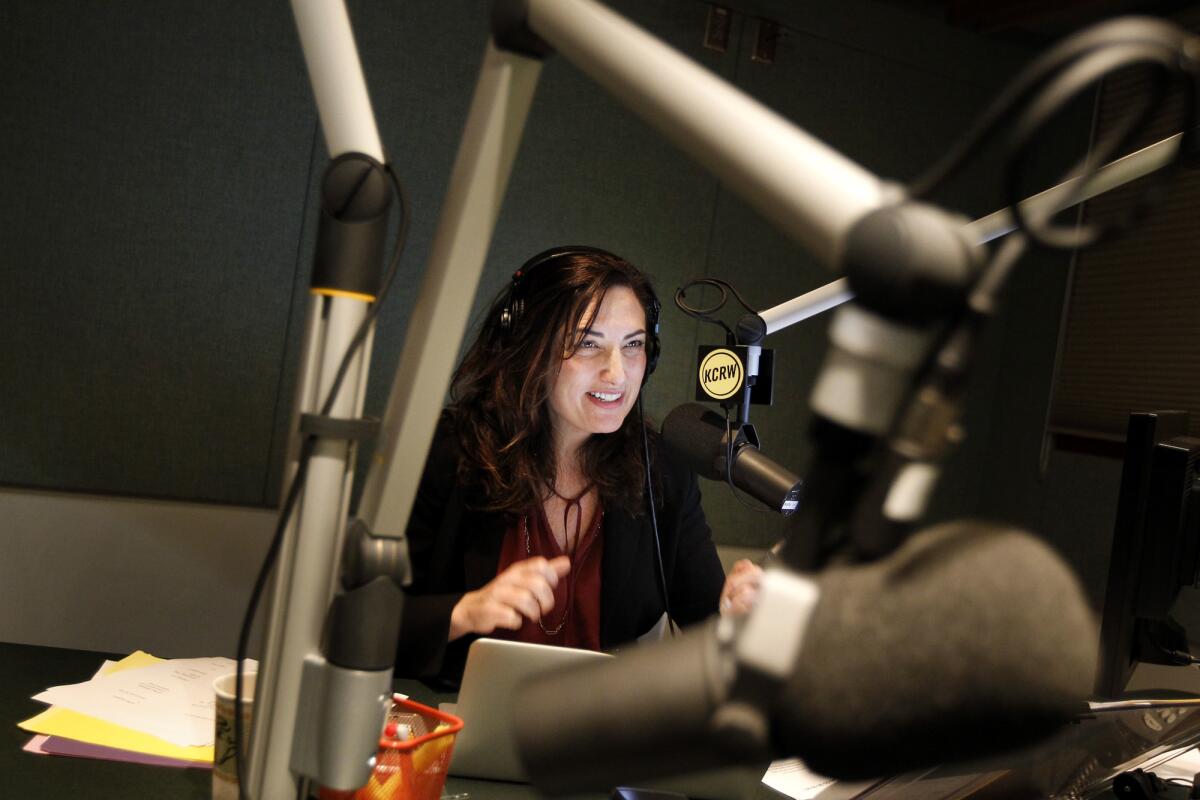
One of Ferro’s most effective pitches is based on her belief in the station’s value. “We serve the whole person,” she says, noting that the station’s contributors include “experts on food and art and music and film — to me, all the things that make life beautiful, make living in Los Angeles worth living. It’s the reason why we tolerate high home prices and terrible traffic.”
To that end, KCRW’s new center will expand its independent producer project, which offers work space and access to some of the Media Center’s 24 production studios to content creators. Ferro calls it “a division that’s cranking out a lot of great stuff.”
The tricky part? “You just don’t know what’s going to be a hit, and how to find it. It’s a mystery,” Ferro says.
The Spotify factor
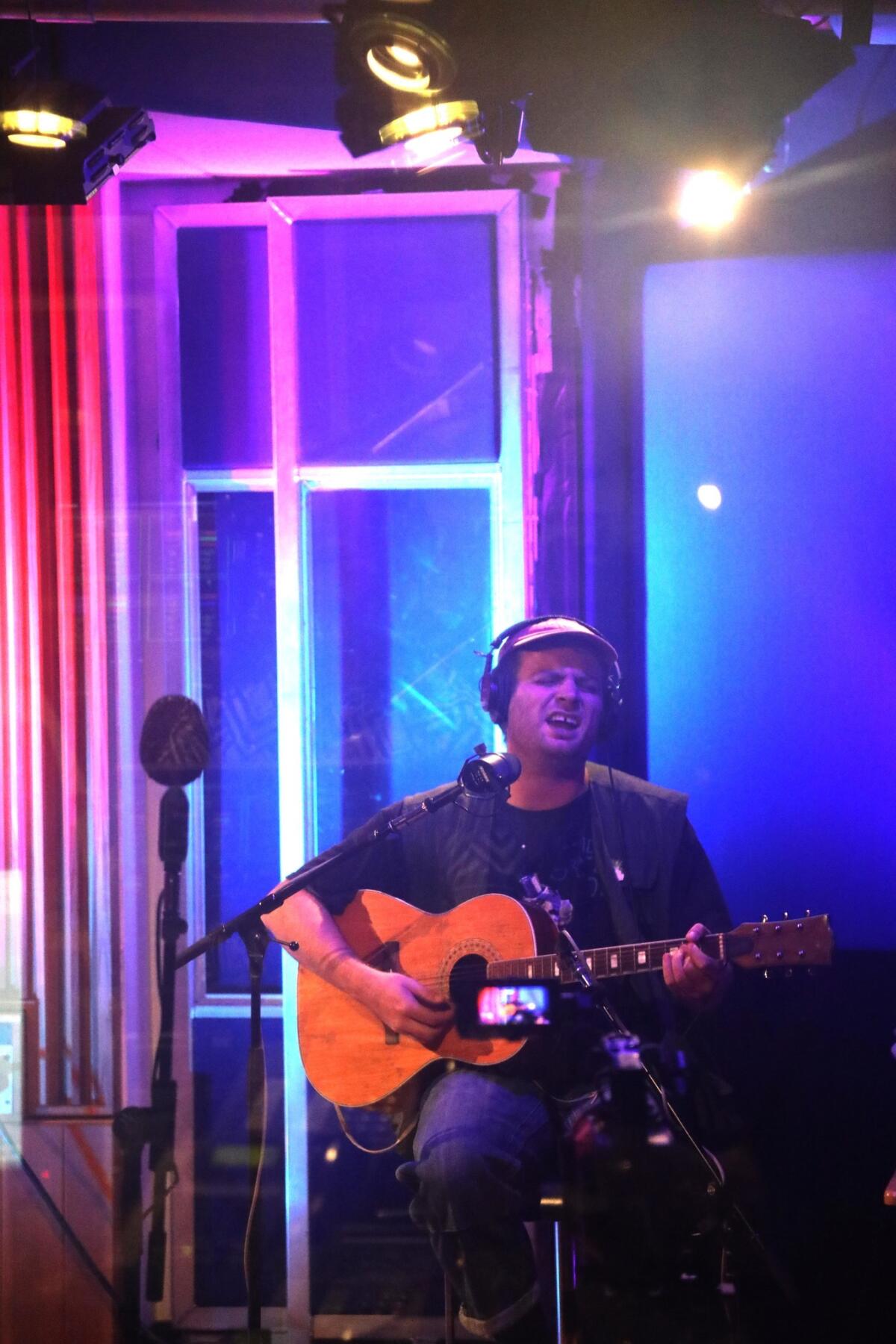
One morning late last year, singer and songwriter Mac DeMarco was standing in the hallway of the basement studios staring at a wall filled with Polaroids of artists, actors and various other famous people who have visited KCRW.
Moving past photos of actor-director Jordan Peele and creative partner Keegan-Michael Key, singer Sharon Van Etten, John Doe of the L.A. punk band X, “The Sopranos” creator David Chase, keyboardist Booker T. Jones, singer-songwriter-guitarist St. Vincent and avant R&B star and actress Janelle Monáe, DeMarco finally found a photo of himself taken at his first KCRW performance. “I was so sick that day,” he says, pointing to a pale, skinny version of himself.
A few minutes later, DeMarco was seated in the performance studio, acoustic guitar in hand, as Bentley introduced him as part of “Morning Becomes Eclectic.”
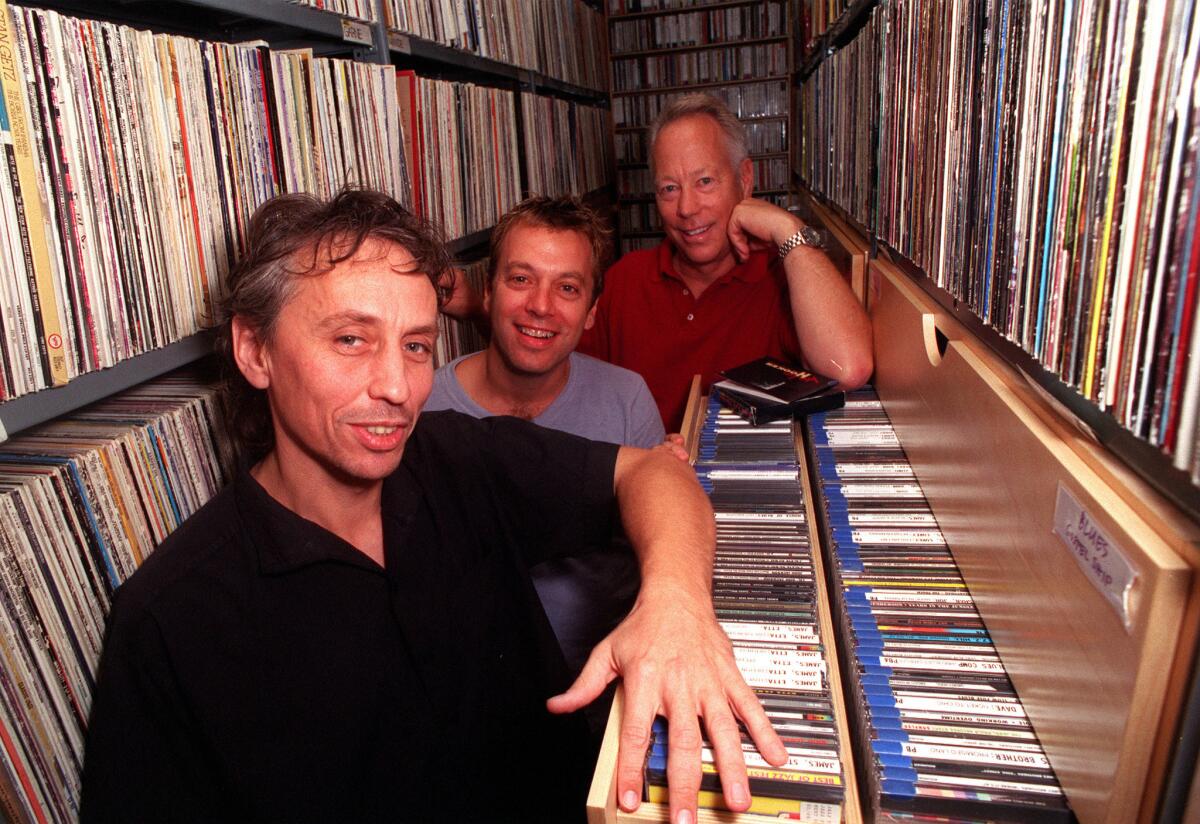
Variations on this ritual have occurred thousands of times. An internationally known brand that has not only celebrated countless marquee artists but also made stars of former hosts Chris Douridas, Nic Harcourt and Tom Schnabel, “Morning Becomes Eclectic” has long dominated the musical conversation among the city’s entertainment elite.
The show’s competitors now include the world’s richest companies, including Spotify and Apple, says Bentley.
Indeed, Spotify playlists trace day-to-day shifts, offering endless avenues of exploration. Poachers stand at the ready. Bentley says he’s had to call out label managers after seeing Apple Music scheduling Beats One live performances of what he calls his “core artists” to air just as “Morning Becomes Eclectic” begins at 9 a.m.
The even-toned DJ, who speaks with a clarity that dictation software reads with pinpoint accuracy, bemoans another competitor that is “trying to draw listeners from us by putting out billboards right in our backyard.”
“It just bugs me,” he adds, while acknowledging that it comes with the territory.
KCRW’s ears
As music director, Bentley, who started at the station in the early 1990s, is the aesthetic ears of the station, a role whose major responsibility is to channel music to and interact with an audience that he and his predecessors have built from the bunker.
Bentley, whose star has risen as an A&R executive and as a DJ on the touring circuit, considers himself “responsible for serving that group and keeping them interested and stimulated. And that group is growing and evolving and moving. It locates itself around the world.”
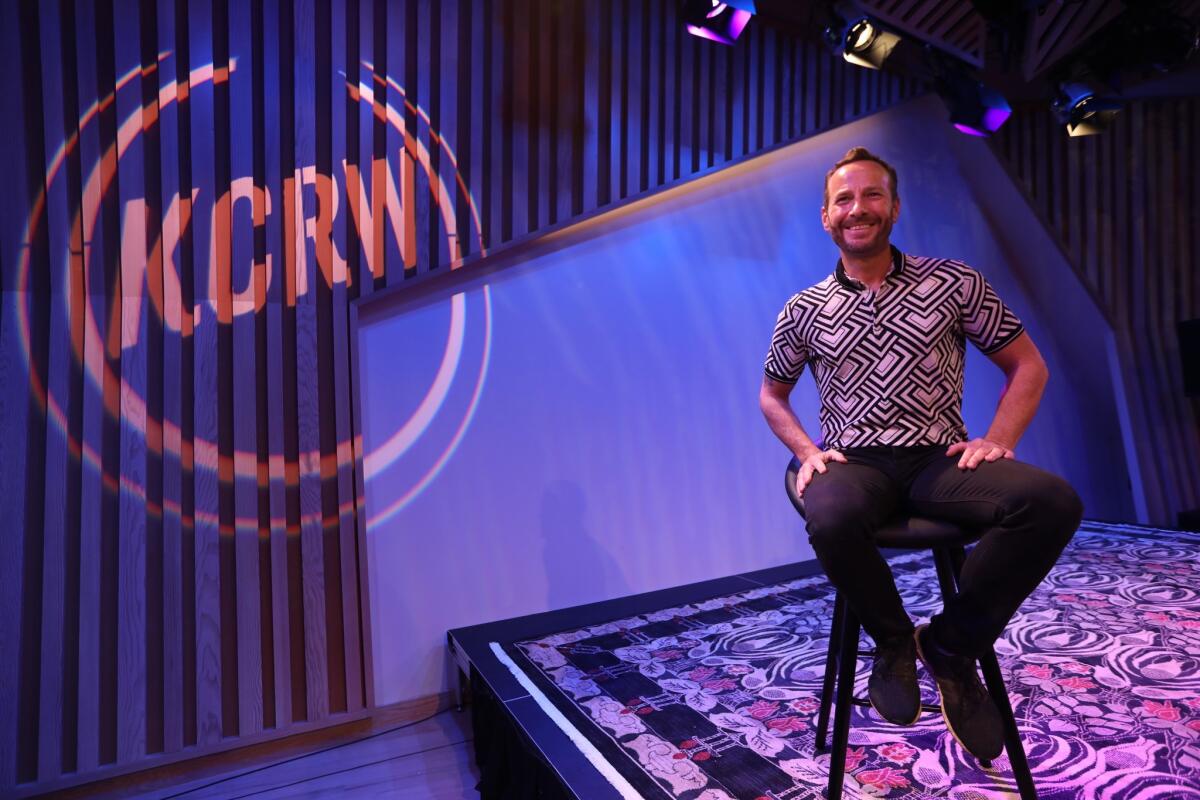
What he calls this “very old-timey, direct, traditional broadcast radio relationship” hasn’t much changed over the years, even if the sounds have. Bentley uses the word “certainty” when discussing his role as music director, one he says is “based on my experience, which is a unique one, of having been at KCRW for so very long. I’ve worked with every single music director that has preceded me.”
If that sounds like a dated approach in a data- and algorithm-driven world, Bentley isn’t apologetic about it. His show reflects his taste to a fault, which is heavy on music made in the so-called adult alternative realm. His morning shows deliver a tasteful, mostly mid-tempo blend of unaggressive beat and rhythm-based music. He rarely plays hip-hop — it’s not what the listeners want, he says — and he loves a good left-of-center ballad.
“I’m a big believer in the power of music programming to build radio audience,” Bentley says when asked about a common critique of his oft-mellow aesthetic.
“As the word itself suggests, ‘programming’ is about creating patterns and thoughtfully shaping the sound of the station.” Those patterns, he adds, enable the station to support artists who excite the programmers and are designed to highlight bands that have new projects and tours coming to town.
The goal, he says, is to continue KCRW’s role as “a vital part of the indie music ecosystem. It allows us to be part of a bigger conversation, rather than exclusive and elitist.”
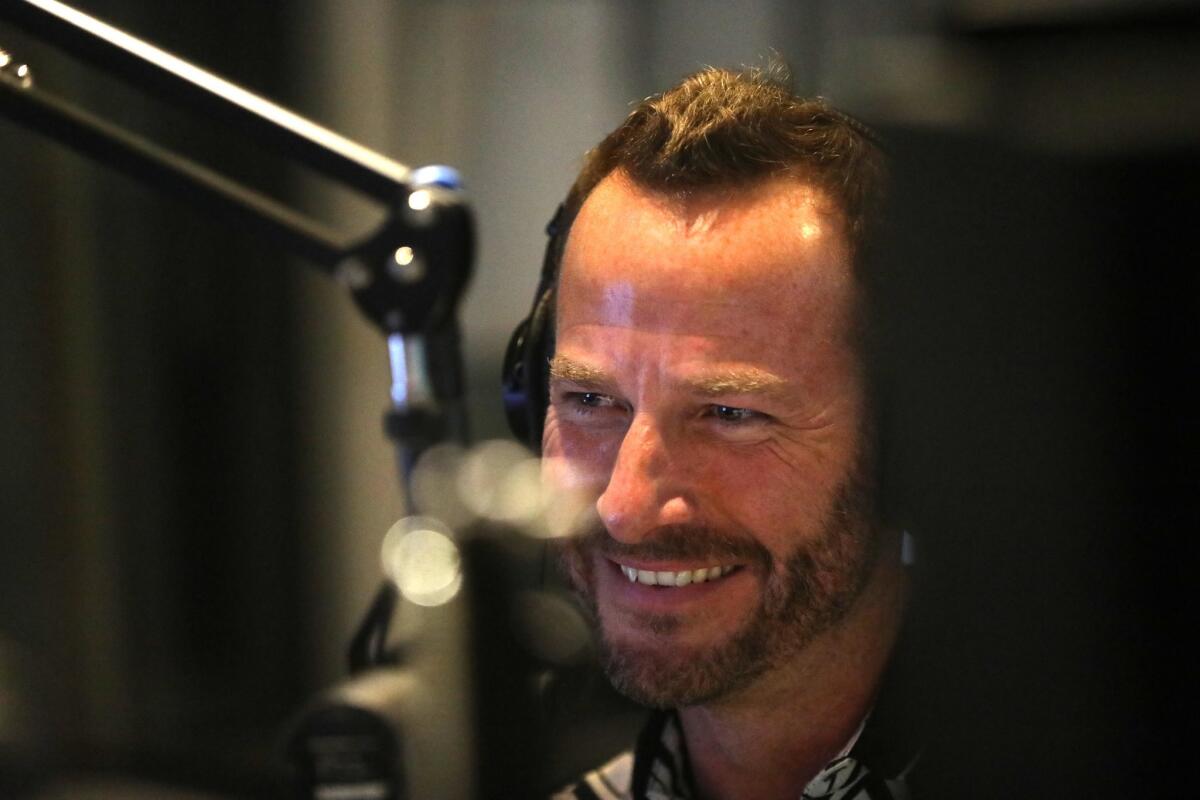
The focus, adds Ferro, is on what the station has long described as “hand-picked” programming. “The way music is going now, it’s like, ‘I want to hear ‘90s music, or I want to hear bands that sound like this thing.’ You’re not going to get that at [‘Morning Becomes Eclectic’]. You’re going to get a curated experience of someone saying, ‘This what I think you need to pay attention to right now.’”
Bentley’s line-up of music programmers, many of whom have been on the air at the station for more than a decade, reflects his aesthetic. Weeknight host Garth Trinidad describes his tastes as “an international mix of future soul, deep dance, indie rock and jazz,” which in practice means mixing classic work by Al Green with contemporary soul singer Leon Bridges or back-to-back new tracks from Solange, Stereolab, Bonobo and Andrew Bird.
Longtime weekend DJ Anne Litt offers a similarly tasteful mix, but she can surprise with a left-field Meat Puppets classic. Late nights are devoted to underground house, techno and experimental electronic music.
In fall, Bentley cut loose Gary Calamar, who had been on KCRW for more than 20 years, and shuffled the station’s weekend rotation. Bentley says no further changes are in the offing.
Henry Rollins is the outlier. The former Black Flag singer, actor, writer and monologuist will soon celebrate a decade doing a show on the station, where each weekend (currently 8-10 p.m. Sundays), he plays two hours of often punk-inspired music. Unlike other KCRW programmers, Rollins isn’t expected to spin a few songs each show from a Bentley-selected rotation of new releases.
Not that Bentley didn’t make the request. Rollins recalls that when he first came on, Bentley said his programming philosophy was “that no show is an island.” Rollins asked him to clarify, and he recalls Bentley telling him, “‘Well, when there is a new record out, all the presenters will play it, and there will be a continuity from show to show.’”
Rollins hadn’t yet done his first set. “I like transparency. I said, ‘Jason, I can’t guarantee that’s going to happen’,” Rollins recalls.
“And that’s not anti-Jason,” he stresses. “I’m going to sit in my office, and I’m going to make the show from what I want to play. It’s going to be FCC friendly — and past that, bite me.”
Rollins’ formula worked. “I was at Gelson’s last night — some woman came up and said, ‘Love the show.’ When I get that, it makes me really like L.A. I feel local,” he says. “We’ve helped turn L.A. from this anonymous place full of go-getters into a place that has an analog pulse.”
What’s less certain is Bentley’s future at the station. In December, he celebrated his 10th anniversary in the role. Saying he always envisioned working in the position for that duration, he views himself as being “at the tail end” of his time as music director and, by extension, host of “Morning Becomes Eclectic.”
Asked about Bentley’s potential departure, Ferro says in an email: “KCRW has always been about renewal. The program ‘Morning Becomes Eclectic’ grows and evolves with each new music director. As far as a time-frame, we want to get settled in our new building and then Jason and I will plot out our next steps.”
“There’s a magic here that I definitely am going to miss,” Bentley says.
But don’t count Bentley — or KCRW — out yet. As Bentley puts, “Let’s get to the building and then we’ll figure out a plan for a transition.”
For tips, records, snapshots and stories on Los Angeles music culture, follow Randall Roberts on Twitter and Instagram: @liledit. Email: [email protected].
More to Read
The biggest entertainment stories
Get our big stories about Hollywood, film, television, music, arts, culture and more right in your inbox as soon as they publish.
You may occasionally receive promotional content from the Los Angeles Times.


